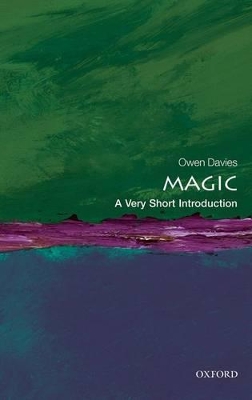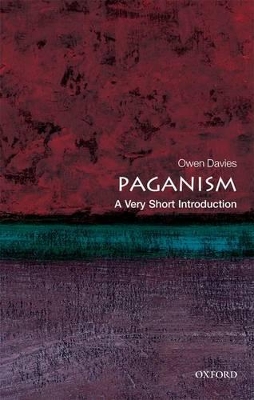Very Short Introductions
2 total works
Defining 'magic' is a maddening task. Over the last century numerous philosophers, anthropologists, historians, and theologians have attempted to pin down its essential meaning, sometimes analysing it in such complex and abstruse depth that it all but loses its sense altogether. For this reason, many people often shy away from providing a detailed definition, assuming it is generally understood as the human control of supernatural forces.
'Magic' continues to pervade the popular imagination and idiom. People feel comfortable with its contemporary multiple meanings, unaware of the controversy, conflict, and debate its definition has caused over two and a half millennia. In common usage today 'magic' is uttered in reference to the supernatural, superstition, illusion, trickery, religious miracles, fantasies, and as a simple superlative. The literary confection known as 'magical realism' has considerable appeal and many modern
scientists have ironically incorporated the word into their vocabulary, with their 'magic acid', 'magic bullets' and 'magic angles'.
Since the so-called European Enlightenment magic has often been seen as a marker of primitivism, of a benighted earlier stage of human development. Yet across the modern globalized world hundreds of millions continue to resort to magic - and also to fear it. Magic provides explanations and remedies for those living in extreme poverty and without access to alternatives. In the industrial West, with its state welfare systems, religious fundamentalists decry the continued moral threat posed by
magic. Under the guise of neo-Paganism, its practice has become a religion in itself. Magic continues to be a truly global issue.
This Very Short Introduction does not attempt to provide a concluding definition of magic: it is beyond simple definition. Instead it explores the many ways in which magic, as an idea and a practice, has been understood and employed over the millennia.
ABOUT THE SERIES: The Very Short Introductions series from Oxford University Press contains hundreds of titles in almost every subject area. These pocket-sized books are the perfect way to get ahead in a new subject quickly. Our expert authors combine facts, analysis, perspective, new ideas, and enthusiasm to make interesting and challenging topics highly readable.
'Magic' continues to pervade the popular imagination and idiom. People feel comfortable with its contemporary multiple meanings, unaware of the controversy, conflict, and debate its definition has caused over two and a half millennia. In common usage today 'magic' is uttered in reference to the supernatural, superstition, illusion, trickery, religious miracles, fantasies, and as a simple superlative. The literary confection known as 'magical realism' has considerable appeal and many modern
scientists have ironically incorporated the word into their vocabulary, with their 'magic acid', 'magic bullets' and 'magic angles'.
Since the so-called European Enlightenment magic has often been seen as a marker of primitivism, of a benighted earlier stage of human development. Yet across the modern globalized world hundreds of millions continue to resort to magic - and also to fear it. Magic provides explanations and remedies for those living in extreme poverty and without access to alternatives. In the industrial West, with its state welfare systems, religious fundamentalists decry the continued moral threat posed by
magic. Under the guise of neo-Paganism, its practice has become a religion in itself. Magic continues to be a truly global issue.
This Very Short Introduction does not attempt to provide a concluding definition of magic: it is beyond simple definition. Instead it explores the many ways in which magic, as an idea and a practice, has been understood and employed over the millennia.
ABOUT THE SERIES: The Very Short Introductions series from Oxford University Press contains hundreds of titles in almost every subject area. These pocket-sized books are the perfect way to get ahead in a new subject quickly. Our expert authors combine facts, analysis, perspective, new ideas, and enthusiasm to make interesting and challenging topics highly readable.
'Paganism' is an evocative word that, even today, conjures up deep-seated emotions and prejudices. Until recently, it was primarily a derogatory term used by Christians to describe the non-Christian cultures confronted and vanquished by their Churches. For some it evokes images of sacrifice and barbaric behaviour, while for others it symbolises a peace-loving, nature-worshipping spiritual relationship with the earth.
This Very Short Introduction explores the meaning of paganism - through a chronological overview of the attitudes towards its practices and beliefs - from the ancient world through to the present day. Owen Davies largely looks at paganism through the eyes of the Christian world, and how, over the centuries, notions and representations of its nature were shaped by religious conflict, power struggles, colonialism, and scholarship.
Despite the expansion of Christianity and Islam, Pagan cultures continue to exist around the world, whilst in the West new formations of paganism constitute one of the fastest-growing religions. Focussing on paganism in Europe, but exploring the nature of paganism globally, Davies looks at how Europeans discovered new cultures through colonial expansion, missionary work, and anthropological study. Contemporary social paganism can be a liberating and social force, and the idea of a global Pagan
theology is now on the religious map.
ABOUT THE SERIES: The Very Short Introductions series from Oxford University Press contains hundreds of titles in almost every subject area. These pocket-sized books are the perfect way to get ahead in a new subject quickly. Our expert authors combine facts, analysis, perspective, new ideas, and enthusiasm to make interesting and challenging topics highly readable.
This Very Short Introduction explores the meaning of paganism - through a chronological overview of the attitudes towards its practices and beliefs - from the ancient world through to the present day. Owen Davies largely looks at paganism through the eyes of the Christian world, and how, over the centuries, notions and representations of its nature were shaped by religious conflict, power struggles, colonialism, and scholarship.
Despite the expansion of Christianity and Islam, Pagan cultures continue to exist around the world, whilst in the West new formations of paganism constitute one of the fastest-growing religions. Focussing on paganism in Europe, but exploring the nature of paganism globally, Davies looks at how Europeans discovered new cultures through colonial expansion, missionary work, and anthropological study. Contemporary social paganism can be a liberating and social force, and the idea of a global Pagan
theology is now on the religious map.
ABOUT THE SERIES: The Very Short Introductions series from Oxford University Press contains hundreds of titles in almost every subject area. These pocket-sized books are the perfect way to get ahead in a new subject quickly. Our expert authors combine facts, analysis, perspective, new ideas, and enthusiasm to make interesting and challenging topics highly readable.

